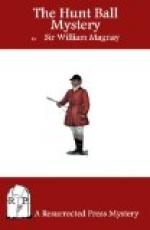“Yes; he is expected there to-morrow morning, if not to-night.”
“You may perhaps,” the girl proceeded, “be able—I don’t know how, and I have no right to ask it—”
“Please, Miss Morriston!” Gifford pleaded.
“To minimize any annoyance we are likely to suffer through his—his uncomfortable zeal,” she resumed hesitatingly. “If not that, you may, if he is friendly with you, have an opportunity of getting to hear something of his plans and ideas, and warning me if he is likely to worry us at Wynford. We don’t want the tragedy kept alive indefinitely; it would be intolerable. I am sure you understand how I feel. That is all.”
“You may rely on me to the utmost,” Gifford assured her fervently, in answer to the question in her eyes.
“Thank you,” she said, as she rose. “I felt sure I might ask you this favour and trust you.”
She made a slight movement of putting out her hand. The gesture was coldly made; it might, indeed, have been checked, and gone for nothing. But Gifford, keenly on the alert for a sign of regard, was quick to take the hand and press it impulsively.
“You may trust me, Miss Morriston,” he murmured.
“Thank you,” she responded simply, but, he was glad to notice, with a touch of relief.
She lightly took his arm and they went back to the ball-room.
CHAPTER XII
HAD HENSHAW A CLUE?
Next day Gervase Henshaw made his expected reappearance in Branchester. He left his luggage at the Golden Lion and then went off to the police-station where he had a long interview with the chief constable. Mindful of his promise to Edith Morriston, Hugh Gifford kept about the town with the object of coming across Henshaw and getting to know, if possible, something of his intentions. The attraction he had, even from their first introduction, felt towards Miss Morriston had become quickly intensified by their strangely confidential talk on the previous evening. So far she was to him something of a puzzle, but a puzzle of the most fascinating kind. It was, perhaps, strangely unaccountable that she should have chosen to invoke his help who was little more than a casual acquaintance; still, he argued as he reviewed the situation, she had probably been drawn to him as the one man on the spot who was likely to be of use to them. Her brother, a good, sensible fellow of some character, was nevertheless an ordinary country gentleman, given up to sport of all kinds and naturally quite unversed in the subtleties of life and character which can be studied only by those who live in the more intellectual atmosphere of cities. The same judgment would apply to his friend Kelson, a chivalrous sportsman, who would unselfishly do anything in his power to be of help, but whose ability and penetration by no means matched his willingness. And probably these men were types of the bulk of the Morristons’




